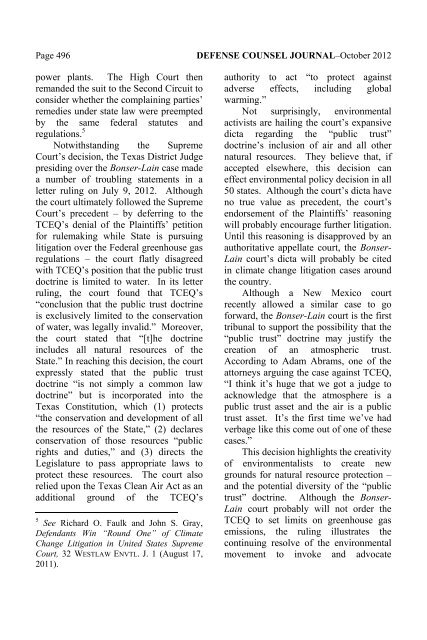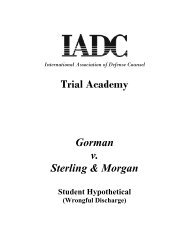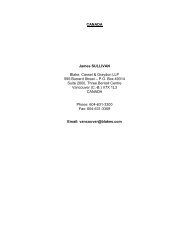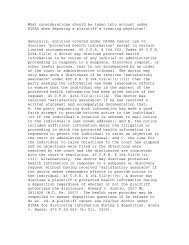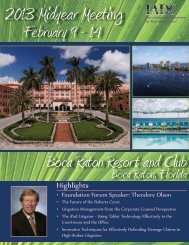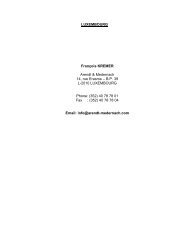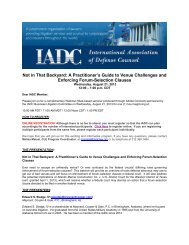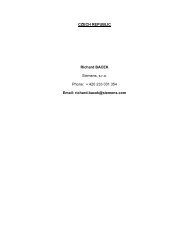Defense Counsel Journal - International Association of Defense ...
Defense Counsel Journal - International Association of Defense ...
Defense Counsel Journal - International Association of Defense ...
Create successful ePaper yourself
Turn your PDF publications into a flip-book with our unique Google optimized e-Paper software.
Page 496 DEFENSE COUNSEL JOURNAL–October 2012power plants. The High Court thenremanded the suit to the Second Circuit toconsider whether the complaining parties’remedies under state law were preemptedby the same federal statutes andregulations. 5Notwithstanding the SupremeCourt’s decision, the Texas District Judgepresiding over the Bonser-Lain case madea number <strong>of</strong> troubling statements in aletter ruling on July 9, 2012. Althoughthe court ultimately followed the SupremeCourt’s precedent – by deferring to theTCEQ’s denial <strong>of</strong> the Plaintiffs’ petitionfor rulemaking while State is pursuinglitigation over the Federal greenhouse gasregulations – the court flatly disagreedwith TCEQ’s position that the public trustdoctrine is limited to water. In its letterruling, the court found that TCEQ’s“conclusion that the public trust doctrineis exclusively limited to the conservation<strong>of</strong> water, was legally invalid.” Moreover,the court stated that “[t]he doctrineincludes all natural resources <strong>of</strong> theState.” In reaching this decision, the courtexpressly stated that the public trustdoctrine “is not simply a common lawdoctrine” but is incorporated into theTexas Constitution, which (1) protects“the conservation and development <strong>of</strong> allthe resources <strong>of</strong> the State,” (2) declaresconservation <strong>of</strong> those resources “publicrights and duties,” and (3) directs theLegislature to pass appropriate laws toprotect these resources. The court alsorelied upon the Texas Clean Air Act as anadditional ground <strong>of</strong> the TCEQ’s5 See Richard O. Faulk and John S. Gray,Defendants Win “Round One” <strong>of</strong> ClimateChange Litigation in United States SupremeCourt, 32 WESTLAW ENVTL. J. 1 (August 17,2011).authority to act “to protect againstadverse effects, including globalwarming.”Not surprisingly, environmentalactivists are hailing the court’s expansivedicta regarding the “public trust”doctrine’s inclusion <strong>of</strong> air and all othernatural resources. They believe that, ifaccepted elsewhere, this decision caneffect environmental policy decision in all50 states. Although the court’s dicta haveno true value as precedent, the court’sendorsement <strong>of</strong> the Plaintiffs’ reasoningwill probably encourage further litigation.Until this reasoning is disapproved by anauthoritative appellate court, the Bonser-Lain court’s dicta will probably be citedin climate change litigation cases aroundthe country.Although a New Mexico courtrecently allowed a similar case to g<strong>of</strong>orward, the Bonser-Lain court is the firsttribunal to support the possibility that the“public trust” doctrine may justify thecreation <strong>of</strong> an atmospheric trust.According to Adam Abrams, one <strong>of</strong> theattorneys arguing the case against TCEQ,“I think it’s huge that we got a judge toacknowledge that the atmosphere is apublic trust asset and the air is a publictrust asset. It’s the first time we’ve hadverbage like this come out <strong>of</strong> one <strong>of</strong> thesecases.”This decision highlights the creativity<strong>of</strong> environmentalists to create newgrounds for natural resource protection –and the potential diversity <strong>of</strong> the “publictrust” doctrine. Although the Bonser-Lain court probably will not order theTCEQ to set limits on greenhouse gasemissions, the ruling illustrates thecontinuing resolve <strong>of</strong> the environmentalmovement to invoke and advocate


